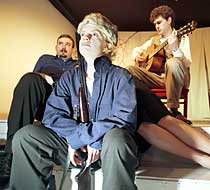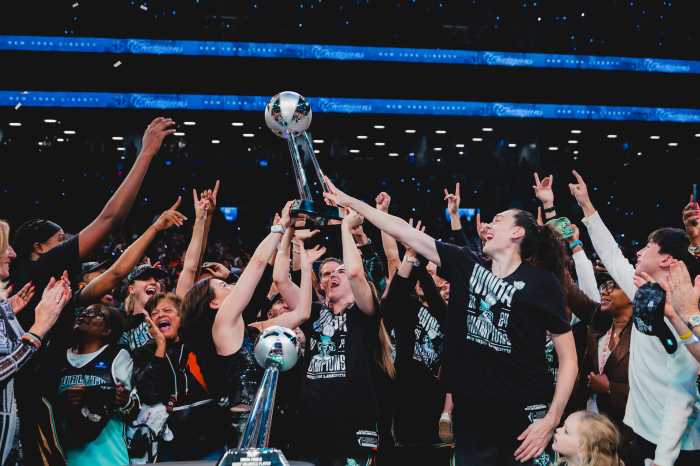In his notes to "The Cherry Orchard,"
director Michael Raimondi writes, "The Cherry Orchard is
a comedy! Unfortunately, Chekhov has been stigmatized as a classic
writer, of classic plays, derived from the Moscow Art Theatre
and the Stanislavski system of acting, leaving no room for his
original intention. Chekhov wanted his plays to be almost vaudevillian
in style."
To correct this error, Raimondi says he has attempted to "meld
some of Stanislavski’s ideals of naturalistic acting with an
impressionistic, post-modern design, while accentuating the joy
and comedy of the play."
Indeed, the production now at The Impact Theater is acted in
a naturalistic style that would warm Stanislavski’s Russian heart,
and the stage, with its billowing curtains that conceal then
reveal the actors, does have an impressionistic air about it.
But as for comedy – this production proceeded at such a glacial
pace that, while following the plodding action, one is more likely
to shed tears of frustration than burst into laughter.
Of course, one of the hallmarks of a Chekhov play is that nothing
ever happens. As is often the case in real life, the inhabitants
of Chekhov’s world are too immobilized by their own anxiety and
inertia to effect any change that might free them from the chains
of their stifling existence.
In "The Cherry Orchard," Lyubov (Deborah Pautler) cannot
bear to sell her beloved orchard even in the face of financial
ruin. Her daughters, Varya (Alexandra Eitel) and Anya (Emily
James) are unable to find appropriate mates. And Lyubov’s brother,
Gayev (David Perez), spends his time making rambling speeches
no one is interested in hearing.
Raimondi seems to believe the way to portray Chekhov’s languid
and languishing characters is by having every statement followed
by 10 minutes of silence before the next speaker gathers enough
energy to respond, or (in typical Chekovian style) to say something
totally irrelevant. On stage, there’s one word for this: boring!
Life may be uneventful for the characters in "The Cherry
Orchard." But the challenge for any director of this play
is to make this lack of activity interesting to the audience.
The way to make an audience appreciate the stifling world of
this provincial Russian town is not by putting everyone to sleep.
That’s not to say there aren’t some talented actors in "The
Cherry Orchard." But either they drown in the general lethargy
of the production, or their energy is diffused by the poor performances
of other actors.
Pautler’s fey and oblivious Lyubov is like a latter-day Gracie
Allen, delivering cheerful non-sequiturs and illogical conclusions
with careless abandon. Unfortunately, David Perez is no George
Burns. He mumbles and stumbles over his lines and has such an
obvious Hispanic accent, one cannot help but wonder when the
Conquistadors invaded Russia.
When Tim Lewis enters as Lopakhin, a shrewd businessman who begs
Lyubov to chop down the orchard and build houses on the land,
he injects enough excitement into the play to awaken the audience,
but not the other actors, who continue sleepwalking through the
play.
Raimondi is right-on when he compares "The Cherry Orchard"
to vaudeville. Chekhov’s quick succession of scenes, his incongruities
and his exaltation of the ridiculous are all close cousins of
vaudeville. But the analogy only goes so far.
Vaudeville gave birth to comics like George Jessel, Milton Berle
and Jack Benny, who were all celebrated for their verbal and
visual wit and their split-second timing. They certainly did
not meditate over every word. They were ridiculous and they reveled
in their own absurdity.
Chekhov’s characters take themselves very seriously. They cry.
They threaten suicide. Their pain is real. Unlike the pranksters
in vaudeville, they are people whose actions have consequences.
They are turned out of their beloved home. They lose their fortunes.
They are tricked by lovers.
Writing in pre-revolutionary Russia, Anton Chekhov was able to
touch on some eternal truths: we are born, we die and in between
those two events, fate treats us like a tiny ship in a hurricane.
There’s the drama that makes us both laugh and cry.
This production just makes us sleepy.
"The Cherry Orchard" plays
through June 28, Wednesday through Friday at 8 pm, and Saturday
at 3 pm and 8 pm at The Impact Theater, 190 Underhill Ave., between
Sterling Place and St. Johns Place. Tickets are $15, $12 students.
For reservations, call (718) 390-7163.
























